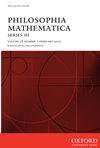想象和预期在可计算性证明的接受中的作用:对标准严谨性描述的挑战
IF 0.8
1区 哲学
Q2 HISTORY & PHILOSOPHY OF SCIENCE
引用次数: 1
摘要
在2022年的一篇论文中,哈马米声称,数学中的正统观点是,如果一个证明可以转化为推导,那么它就是严格的。然后,哈马米发展了一个描述性的描述,解释了数学家如何在这种意义上检查证明的严谨性,以及他们如何发展这样做的能力。通过对可计算理论的介绍性文本的探索,我们证明了哈马米的描述并不符合可计算理论的实际数学实践。相反,我们主张另一种解释,即想象、预期和对自然语言的解释在建立数学严谨性方面发挥作用。本文章由计算机程序翻译,如有差异,请以英文原文为准。
The Role of Imagination and Anticipation in the Acceptance of Computability Proofs: A Challenge to the Standard Account of Rigor
In a 2022 paper, Hamami claimed that the orthodox view in mathematics is that a proof is rigorous if it can be translated into a derivation. Hamami then developed a descriptive account that explains how mathematicians check proofs for rigor in this sense and how they develop the capacity to do so. By exploring introductory texts in computability theory, we demonstrate that Hamami’s descriptive account does not accord with actual mathematical practice with respect to computability theory. We argue instead for an alternative account in which imagination, anticipation, and interpretations of natural language play roles in establishing mathematical rigor.
求助全文
通过发布文献求助,成功后即可免费获取论文全文。
去求助
来源期刊

Philosophia Mathematica
HISTORY & PHILOSOPHY OF SCIENCE-
CiteScore
1.70
自引率
9.10%
发文量
26
审稿时长
>12 weeks
期刊介绍:
Philosophia Mathematica is the only journal in the world devoted specifically to philosophy of mathematics. The journal publishes peer-reviewed new work in philosophy of mathematics, the application of mathematics, and computing. In addition to main articles, sometimes grouped on a single theme, there are shorter discussion notes, letters, and book reviews. The journal is published online-only, with three issues published per year.
 求助内容:
求助内容: 应助结果提醒方式:
应助结果提醒方式:


